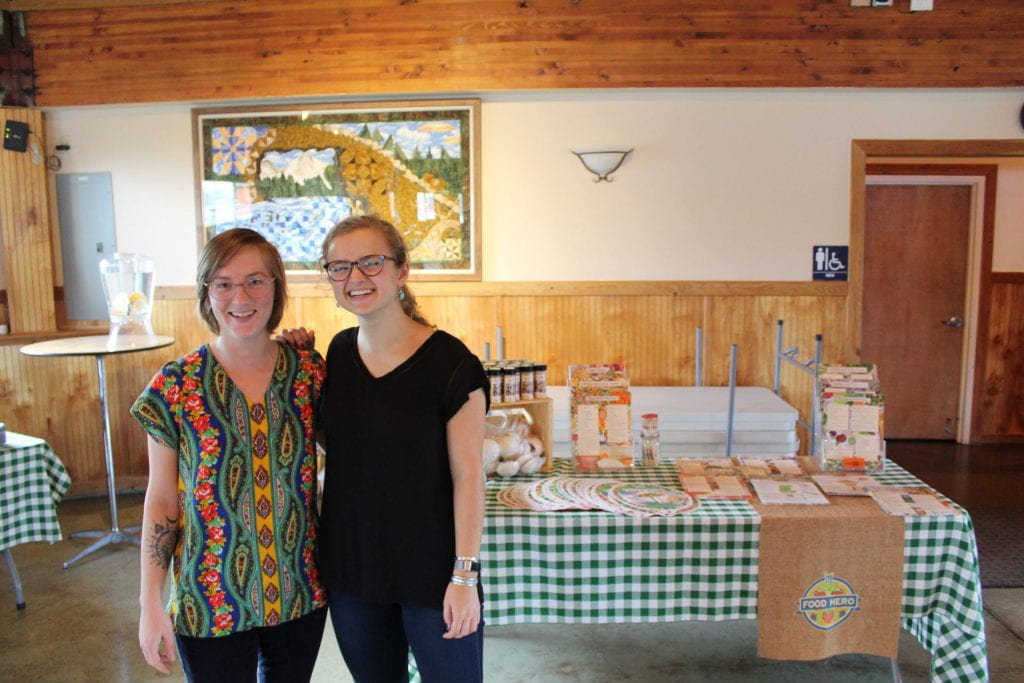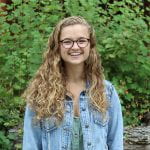By Hannah Fuller, Community Food Systems Organizer, OSU Extension Service Wasco County

Everyone has logged into Zoom for the first time that month. After a series of meetings over conference call fellow RARE, Eva Kahn, and I convinced our partners in South Wasco County to meet over Zoom so we could see each other’s faces. It was time to develop the mission statement and name for a new non-profit in South Wasco County Oregon. Compared to the county seat, The Dalles, South Wasco County has a very different culture. The Dalles sits on the banks of the Columbia River Gorge, while the southern part of the county stretches through grassy hills along the Deschutes River all the way down to the center of the state. South Wasco County is a collection of small towns “you could miss if you blink” but the community is strong.
Eva had organized a F.E.A.S.T. (Food, Education, Agriculture, Solutions, Together) organizing session in March a week before shutdowns from the pandemic hit, and there was still a lot of energy in the community to come together and work to strengthen the local rural food system.
So, there we sat on Zoom. Eva and I acting as outside consultants, and a handful of eager community members ready to work together to start the foundation of this new organization. Eva and I had spent hours preparing our facilitation to help folks work together and create an organization that really reflected all of the community member’s needs. One member sat in the driveway of another to get better Wifi, someone else sat in their kitchen with their husband making lunch behind them, someone’s hair was constantly blowing in the strong eastern Oregon winds as. It wasn’t a picture-perfect meeting area, but it worked.
For being “new to Zoom” everyone quickly dived into our work. We screenshared and took turns picking words, sharing name ideas, nit-picking over every sentence, comma, and turn of phrase. “Is that name common? …People down here don’t like that word. …What does “sustainability” even look like.” Two hours later, we’d come up with a name, a mission statement (what we will do) and even a vision statement (the world we want to see) too. Everyone sat with satisfied grins and I was so glad I could see them over Zoom.
Reflecting on this experience, the community members didn’t like a single word Eva and I suggested, but they were so grateful for our facilitation. Coming from university and non-profit organization backgrounds, Eva and I were ready with piles of buzzwords and turns of phrase that were common in the bubble that we already worked in. But in South Wasco, it’s outside of the bubble and words land differently here. Everyone has different associations with words, and while so many values they describe are similar—hard work, trust, resilience—words have so much power and connotation that they carry with them. It also showed how much value we have as RARE members to provide the infrastructure and support for community development, but in the end, the community members are the ones doing the work. They know the people they work with, they know what works needs to be done, and they are the ones with the visions for what they want their future to look like.
 About the author, Hannah Fuller: Hannah Fuller served as the Community Food Systems Coordinator for the Oregon State University Wasco County Extension Service. Hannah played an integral role in connecting OSU and partner agencies including Gorge Grown Food Network, The Blue Zones Project, North Central Public Health District, and Oregon Food Bank. Duties included program management, assessment, community building, volunteer recruitment, teaching, and outreach. Main focus areas included providing nutrition education, engaging volunteers of the Food Hero Volunteer Training program, conducting a School Physical Activity and Nutrition Environment Tool (SPAN-ET) Evaluation in local schools, serving as a liaison between OSU Extension and the Food Security Coalition, developing gardening partnerships, providing support for Mid-Columbia Medical Center’s Food for Life program, and developing reports to share project aims, outcomes, and recommendations with other partners.
About the author, Hannah Fuller: Hannah Fuller served as the Community Food Systems Coordinator for the Oregon State University Wasco County Extension Service. Hannah played an integral role in connecting OSU and partner agencies including Gorge Grown Food Network, The Blue Zones Project, North Central Public Health District, and Oregon Food Bank. Duties included program management, assessment, community building, volunteer recruitment, teaching, and outreach. Main focus areas included providing nutrition education, engaging volunteers of the Food Hero Volunteer Training program, conducting a School Physical Activity and Nutrition Environment Tool (SPAN-ET) Evaluation in local schools, serving as a liaison between OSU Extension and the Food Security Coalition, developing gardening partnerships, providing support for Mid-Columbia Medical Center’s Food for Life program, and developing reports to share project aims, outcomes, and recommendations with other partners.

